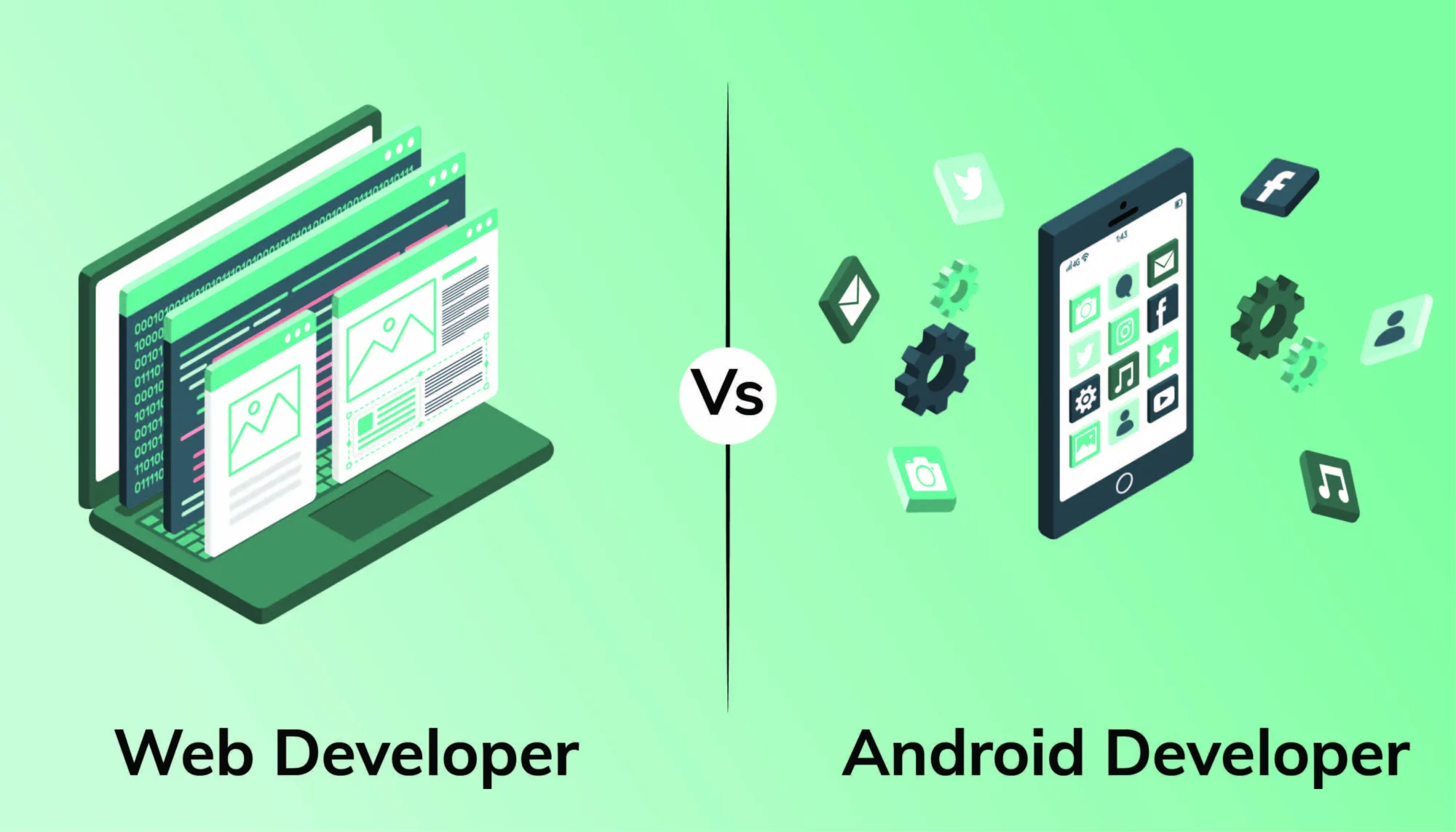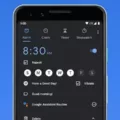Android developers and web developers are both in high demand in today’s digital age. However, when it comes to salary, there is a noticeable difference between the two.
According to data from Glassdoor, Android developers generally earn a higher salary compared to web developers. On average, an Android developer can expect to earn up to INR 4 lakh annually, while a web developer’s average salary is up to INR 5 lakh annually. This salary disparity can be attributed to the relative scarcity of Android developers in the job market compared to web developers.
When it comes to the complexity of the work, web development is generally considered to be easier than Android development. Building a basic web page using HTML and CSS can be relatively straightforward compared to developing a basic Android application. However, it’s important to note that the level of complexity ultimately depends on the specific project being undertaken.
In terms of compensation, freelance mobile developers often have the opportunity to earn higher rates than web developers. This is because they have the freedom to choose the projects they work on and can pitch higher rates for their specialized skills in Android development. On the other hand, web developers may have a wider range of job opportunities available to them, allowing them to reach a larger audience and potentially offer more cost-effective solutions.
Ultimately, the choice between Android development and web development depends on the specific needs of the project. If a personalized user experience and the utilization of platform-specific features are important, Android development may be the better choice. However, if reaching a wider audience and offering a more cost-effective solution is the goal, web development may be the preferred option.
While Android developers tend to earn a higher salary and the work may be more challenging, web development offers its own advantages in terms of job opportunities and cost-effectiveness. The choice between the two ultimately depends on the specific requirements of the project and the desired outcome.

Who Earns More Android Developer Or Web Developer?
Android developers generally earn a higher salary compared to web developers. Data from Glassdoor indicates that the average annual salary for an Android developer is up to INR 4 lakh. On the other hand, web developers earn an average salary of up to INR 5 lakh annually.
Which is Better Android Development Or Web Development?
When comparing Android development and web development, it is important to consider various factors to determine which is better. Here is a detailed analysis of both:
Android Development:
1. Platform-specific: Android development involves creating applications specifically for the Android operating system, using programming languages such as Java or Kotlin.
2. User experience: Android apps provide a more immersive user experience with features like push notifications, access to device hardware, and integration with other apps.
3. Market reach: Android has a larger market share globally, providing potential for a wider audience and more users for your app.
4. Monetization options: Android apps allow various monetization options, such as in-app purchases, subscriptions, and advertisements, which can generate revenue.
5. Learning curve: Android development can be more challenging for beginners due to its complex ecosystem and the need to learn specific programming languages and frameworks.
Web Development:
1. Platform-independent: Web development involves creating websites and web applications that can be accessed from any device with a browser, regardless of the operating system.
2. Accessibility: Web development allows for greater accessibility as websites can be accessed on various devices including desktops, laptops, tablets, and smartphones.
3. Development speed: Web development can be faster as it generally requires knowledge of HTML, CSS, and JavaScript, which are relatively easier to learn compared to Android development.
4. Maintenance and updates: Web applications can be updated and maintained more easily, as changes can be made on the server-side without requiring users to update the app on their devices.
5. SEO and discoverability: Web development offers better search engine optimization (SEO) opportunities, making it easier for users to find your website through search engines.
The choice between Android development and web development depends on the specific requirements of your project. Android development may be more suitable for creating platform-specific applications with advanced features, while web development offers platform independence and accessibility across multiple devices. Consider factors like target audience, functionality, and monetization options to determine which option is better for your project.
Are Mobile Developers Paid More Than Web Developers?
Mobile developers are generally paid more than web developers. This is primarily due to the relative scarcity of skilled mobile developers compared to web developers. The demand for mobile applications has been increasing significantly in recent years, leading to a higher demand for mobile developers.
Here are some key points to consider:
1. Market Rates: Android developers attract more competitive market rates compared to web developers. This is because the skills required for mobile development, especially for Android, are more specialized and in high demand.
2. Scarcity: The scarcity of skilled mobile developers contributes to their higher compensation. Mobile development requires specific knowledge and expertise in mobile platforms and programming languages, such as Java or Swift. This specialization makes mobile developers less common in the job market, leading to higher salaries.
3. Freelance Opportunities: Freelance mobile developers also have the advantage of setting their own rates. Due to the high demand for mobile apps, freelance mobile developers can choose the projects they work on and pitch higher rates. This gives them more control over their compensation compared to web developers.
4. Increasing Importance: Mobile applications have become an integral part of businesses, and companies are willing to invest more in mobile development to reach a larger user base. This increased importance of mobile apps has led to higher compensation for mobile developers.
Mobile developers are generally paid more than web developers due to their relative scarcity, specialized skills, and the increasing demand for mobile applications. Freelance mobile developers also have the opportunity to earn higher rates by choosing their projects and pitching higher compensation.
Is It Better to Be a Web Developer Or a Mobile App Developer?
When considering whether to pursue a career as a web developer or a mobile app developer, it’s important to weigh the advantages and disadvantages of each field.
Web Development:
– Reach: As a web developer, you have the potential to reach a wider audience since websites are accessible across various devices and platforms.
– Cost-effectiveness: Building a website is generally more cost-effective than developing a mobile app, as there is no need to create separate versions for different operating systems.
– Flexibility: Websites can be easily updated and modified, making it convenient to adapt to changing business needs or user requirements.
Mobile App Development:
– Personalized User Experience: Mobile apps offer a more personalized and immersive user experience compared to websites. They can take advantage of device-specific features, such as camera, GPS, and push notifications, providing a more tailored experience for users.
– Offline Access: Unlike websites, mobile apps can provide certain functionalities even when the device is not connected to the internet. This can be advantageous for users who frequently travel or have limited connectivity.
– Monetization Opportunities: Mobile apps offer various monetization options, such as in-app purchases, subscriptions, and advertisements, allowing developers to generate revenue directly from the app.
Ultimately, the choice between web development and mobile app development depends on your goals and the specific requirements of your project. If you need to reach a wider audience and want to offer a more cost-effective solution, web development may be the way to go. On the other hand, if you need a more personalized user experience and want to take advantage of platform-specific features, app development may be the better choice.
Conclusion
When it comes to salary, Android developers generally earn a higher income compared to web developers. The average salary for an Android developer is around INR 4 lakh annually, while for web developers it is around INR 5 lakh annually. This difference in salary can be attributed to the relative scarcity of Android developers in the market compared to web developers.
While web development may be considered easier than Android development overall, the complexity of the project being worked on plays a significant role. Developing a basic web page using HTML and CSS can be relatively straightforward, whereas building a basic Android application may require more technical expertise.
In terms of compensation, freelance mobile developers also tend to earn more than web developers as they have the freedom to choose their projects and pitch higher rates. This is due to the demand for mobile app development and the need for specialized skills in this area.
Ultimately, the choice between web development and Android development depends on the specific requirements of the project. If reaching a wider audience and offering a cost-effective solution is the goal, web development may be the preferred option. On the other hand, if a more personalized user experience and the utilization of platform-specific features are important, app development may be the better choice.
Both web development and Android development offer promising career opportunities with competitive salaries. It ultimately comes down to individual preferences, skills, and project requirements to determine the best path to pursue.













